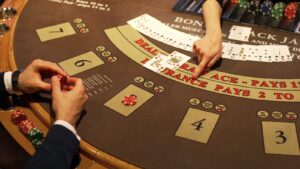
Poker tournaments are a popular form of entertainment in California. They can be found at various casinos across the state and can be a lot of fun for players of all skill levels. There are many different poker tournaments that can be found throughout the state, so it’s important to find one that will fit your needs.
If you’re looking to take your poker skills to the next level, don’t come to a poker tournament in California. The state has some of the harshest gambling laws in the country, and playing in tournaments can land you in jail or even lose your license.
There are a lot of things you should never do when playing poker tournaments in California. The most common one is to gamble, which can lead to expensive losses or even bankruptcy.
You should also avoid drinking alcohol while playing, as it can have negative impacts on your gaming skills and performance. Finally, you should always practice tight organization and planning before each game so that you can get the most out of your resources.
Let’s take a look at six types of mistakes to avoid in tournament poker:
Tournament Participation Without Poker Bonuses
Many players don’t take advantage of additional benefits when they participate in tournaments, according to the BeastsOfPoker bonus guide. Free tournament tickets and other online poker incentives can give you a distinct advantage over competitors who don’t use bonuses. Your first step to increasing your tournament winnings should be to take advantage of the free bonus cash offered on poker sites like Spartan Poker.
Too Quickly Entering Real Money Buy-Ins
Freeroll tournaments are the suggested way to begin practicing if you are new to the game. Poker freerolls allow you to win substantial prizes without spending any of your own money. Our suggested option for a poker room to practice at is Khelo365 because of their Daily Depositors 30k GTD Freeroll. You should gradually begin signing up for real-money tournaments as your bankroll increases and your abilities advance.
Not Stealthy Enough with the Blinds
Your plan’s aggression should vary significantly as the event progresses. Generally speaking, you should begin to open more hands after the antes start, especially from the late position. If the blind players call your raise, you will have an easier time navigating the post-flop situation because they will be out of place.
If you raise to 2.2-2.3 Big Blinds before the flop, you only need to win 50% of the time. Bluffing or having the best hand could win you the pot when called.
Making too many bets on a continuation
Following the publication of Doyle Brunson’s Super System, several players figured out how to bet the flop (c-bet) almost always after raising pre-flop. This tactic was effective since the average opponent would fold too frequently on the flop. But this is no longer the case! It would help if you were selective when choosing a place for the continuation bet in contemporary tournament poker.
What considerations support the idea of placing a c-bet on the flop? To begin, you should make a c-bet when it’s likely that your opponent has missed the flip. Second, you should c-bet whatever solid draws you have. Third, when playing heads-up on the flip, increase the number of your c-bets.
Overplaying pairs and other hands that appear to be strong
It is common to practice gambling your tournament life with an overpair when the stacks are thin in the final stages of a tournament. Playing a mediocre pot is preferable when the heaps are still deep with these kinds of hands.
Consider a scenario where you raise UTG with pocket queens, and the Button and Big Blind follow suit. Flop: 7-5-3, flush draw. Avoid betting your entire stack on a pair of queens early in the game. Both opponents had associated sets and draw. You can place two bets on the flop and river or the turn and river.








